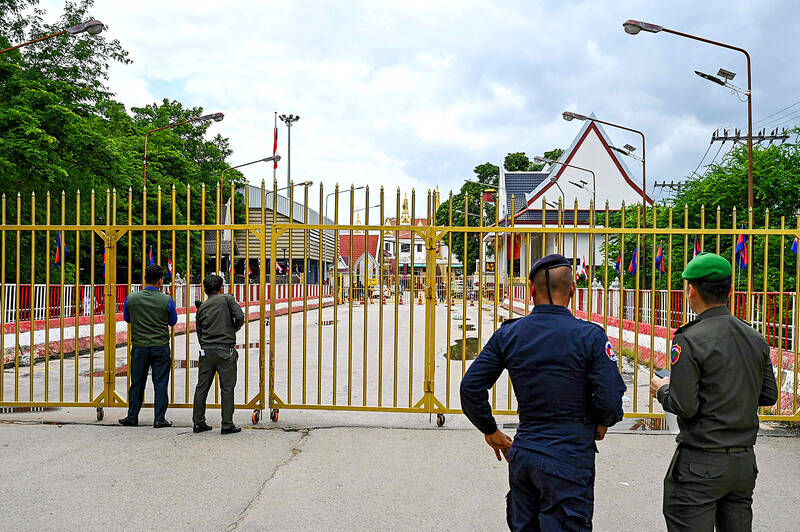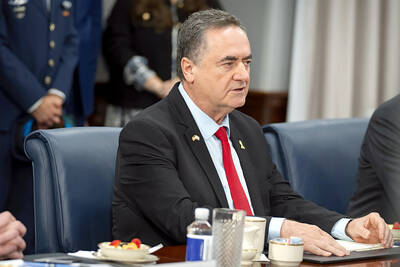Dozens of tourists and workers, some carrying children, were left stranded yesterday at Thailand’s main land crossing with Cambodia, after the army stopped almost all border traffic in an escalating territorial dispute.
Thailand has closed crossing points in all seven border provinces to everyone except students and those seeking medical treatment, after a long-running row erupted into military clashes last month in which a Cambodian soldier was killed.
There was confusion at the Ban Khlong Luek checkpoint in Sa Kaeo Province — the main crossing for people traveling overland to Cambodia’s Siem Reap and the Angkor Wat complex.

Photo: AFP
About 50 Cambodian workers, mostly vendors who regularly cross into Thailand for trade, found themselves stuck at the checkpoint, unable to return home.
“I wanted to go back last night, but had to sleep at my shop instead because police didn’t allow me to cross,” said Malin Po, 38, a clothing seller. “I usually cross every day because I come to work in Thailand and go back home to Cambodia.”
She said no one had explained why the checkpoint was closed, leaving many frustrated.
Riot police were stationed near the crossing point — a grand archway sealed shut with yellow railings — as people trudged back toward the Thai side after being turned away.
Chanta Wo, 32, a Cambodian carpenter based in Sa Kaeo, said he was trying to cross the border after learning that his 73-year-old mother-in-law had just died. Traveling with his wife, brother, two-year-old daughter and a one-month-old baby, he was seen changing his infant son’s nappy on a bench near the checkpoint.
“I was warned away by the police... I’m very concerned,” he said.
As well as Cambodian workers, a handful of tourists hoping to cross the border also found themselves stuck.
Matteo Toso, 34, from Turin, Italy, said he was backpacking across Asia and had spent two months starting from Nepal before attempting to cross into Cambodia.
“I might have to go back to Bangkok and take a plane to Cambodia, but of course that’s more expensive,” he said.
He said he was concerned that tensions between Thailand and Cambodia could impact Thailand’s tourism in the long term.
“I haven’t seen many tourists, but it’s the low season,” he said. “During the high season, this could be bad for the country.”
Thailand and Cambodia are at odds over several small sections of the border in a row that dates back to the drawing of the 800km frontier in the early 20th century during the French occupation of Indochina.
Violence sparked by the dispute has led to at least 28 deaths in the region since 2008, but the issue had died down until last month’s flare-up.
Peace-seeking talks stalled, and Cambodia has banned imports of fuel and oil from Thailand, as well as Thai fruit and vegetables.
The row has also gravely wounded Thai Prime Minister Paetongtarn Shinawatra, who is facing calls to quit over a leaked telephone call with former Cambodian prime minister Hun Sen, which saw her accused of appeasing Phnom Penh and undermining her own military.
Thai border police said it was unclear when the crossing would reopen, adding that officers on the ground were following military orders with limited information.

STEPPING UP: Diminished US polar science presence mean opportunities for the UK and other countries, although China or Russia might also fill that gap, a researcher said The UK’s flagship polar research vessel is to head to Antarctica next week to help advance dozens of climate change-linked science projects, as Western nations spearhead studies there while the US withdraws. The RRS Sir David Attenborough, a state-of-the-art ship named after the renowned British naturalist, would aid research on everything from “hunting underwater tsunamis” to tracking glacier melt and whale populations. Operated by the British Antarctic Survey (BAS), the country’s polar research institute, the 15,000-tonne icebreaker — boasting a helipad, and various laboratories and gadgetry — is pivotal to the UK’s efforts to assess climate change’s impact there. “The saying goes

Police in China detained dozens of pastors of one of its largest underground churches over the weekend, a church spokesperson and relatives said, in the biggest crackdown on Christians since 2018. The detentions, which come amid renewed China-US tensions after Beijing dramatically expanded rare earth export controls last week, drew condemnation from US Secretary of State Marco Rubio, who on Sunday called for the immediate release of the pastors. Pastor Jin Mingri (金明日), founder of Zion Church, an unofficial “house church” not sanctioned by the Chinese government, was detained at his home in the southern city of Beihai on Friday evening, said

TICKING CLOCK: A path to a budget agreement was still possible, the president’s office said, as a debate on reversing an increase of the pension age carries on French President Emmanuel Macron yesterday was racing to find a new prime minister within a two-day deadline after the resignation of outgoing French Prime Minister Sebastien Lecornu tipped the country deeper into political crisis. The presidency late on Wednesday said that Macron would name a new prime minister within 48 hours, indicating that the appointment would come by this evening at the latest. Lecornu told French television in an interview that he expected a new prime minister to be named — rather than early legislative elections or Macron’s resignation — to resolve the crisis. The developments were the latest twists in three tumultuous

FIRST STAGE: Hamas has agreed to release 48 Israeli hostages in exchange for 250 ‘national security prisoners’ as well as 1,700 Gazans, but has resisted calls to disarm Israel plans to destroy what remains of Hamas’ network of tunnels under Gaza, working with US approval after its hostages are freed, it said yesterday. Israeli Minister of Defense Israel Katz said that the operation would be conducted under an “international mechanism” led by the US. “Israel’s great challenge after the hostage release phase will be the destruction of all Hamas terrorist tunnels in Gaza,” Katz said. “I have ordered the army to prepare to carry out this mission,” he added. Hamas operates a network of tunnels under Gaza, allowing its fighters to operate out of sight of Israeli reconnaissance. Some have passed under